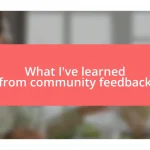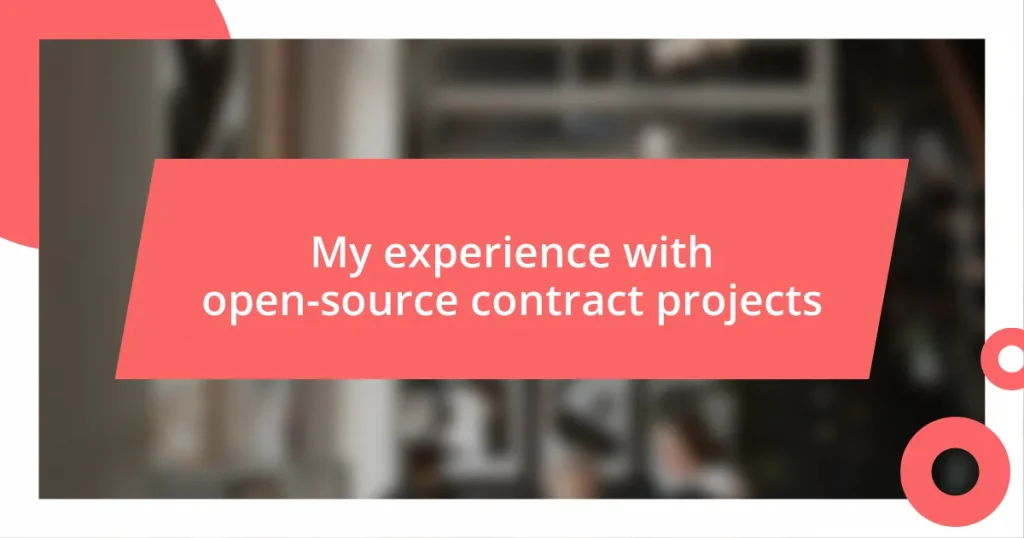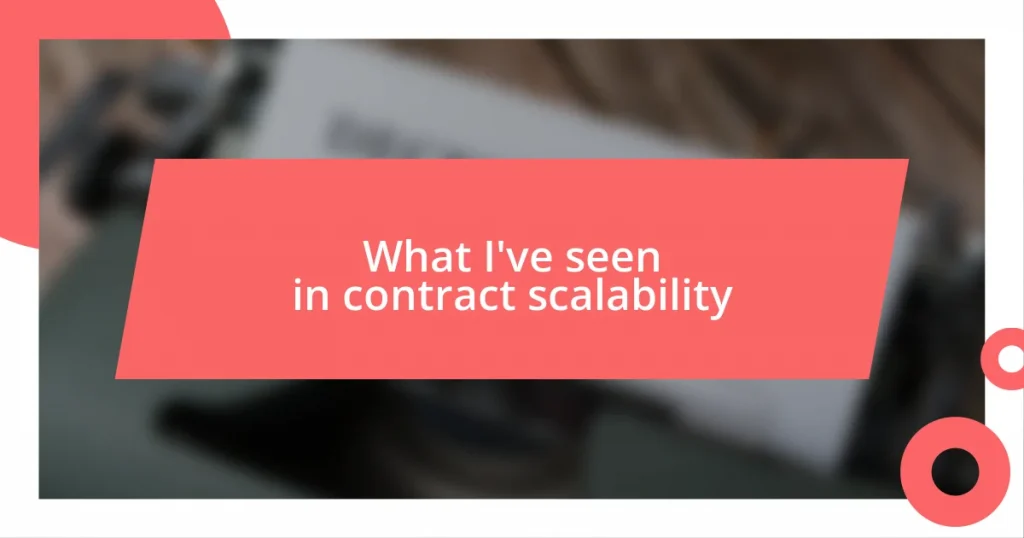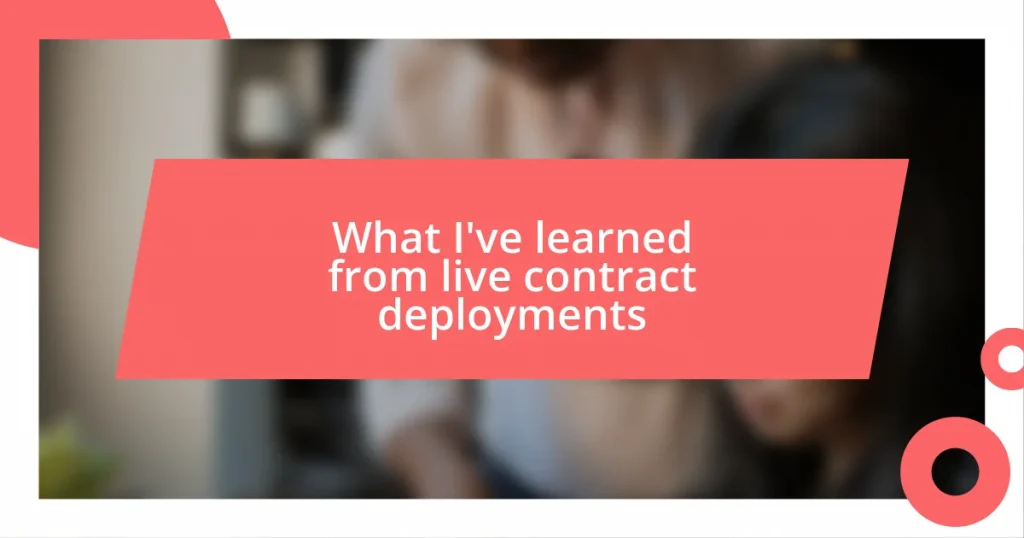Key takeaways:
- Open-source contracts facilitate global collaboration, allowing developers to innovate together while contributing to a shared knowledge pool.
- Effective communication, trust, and celebrating achievements are vital for successful teamwork in open-source projects.
- Flexibility, inclusive decision-making, and reflection are essential lessons learned for adapting to challenges and enhancing collaboration.
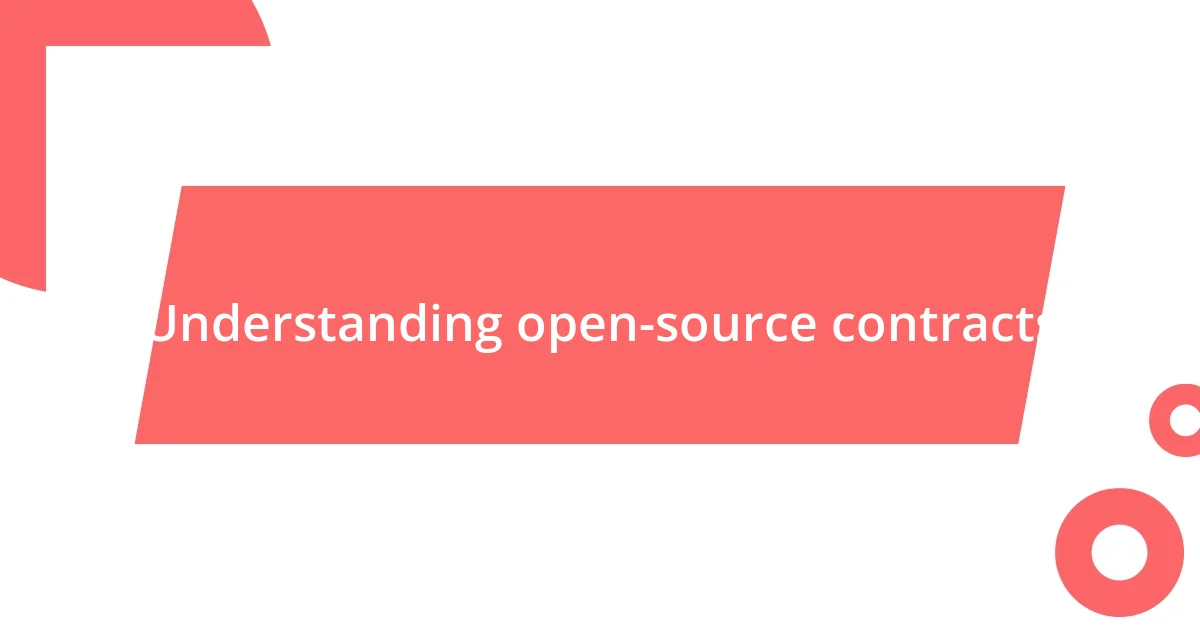
Understanding open-source contracts
Open-source contracts are agreements that allow software to be used, modified, and shared freely under defined conditions. I remember the first time I encountered one; it felt like unlocking a treasure chest of innovation. The sheer potential of collaborating with developers worldwide was thrilling, and I found myself pondering: How often do we get the chance to build with others, regardless of geographical boundaries?
As I dove deeper into the world of open-source contracts, I began to grasp the importance of licensing. Different licenses offer varying levels of freedom and responsibility, which can sometimes feel overwhelming. I once chose a license without fully understanding its implications, leading to confusion in a project. It taught me that each license represents not just legal jargon but also a philosophy of community and collaboration.
What truly stands out to me is the community aspect behind open-source contracts. Each project is a patchwork of contributions, with individuals pouring their time and expertise into something larger than themselves. It’s fascinating to think about how, through these contracts, we can all contribute to a collective knowledge pool—what might we create together if we’re open to collaboration?
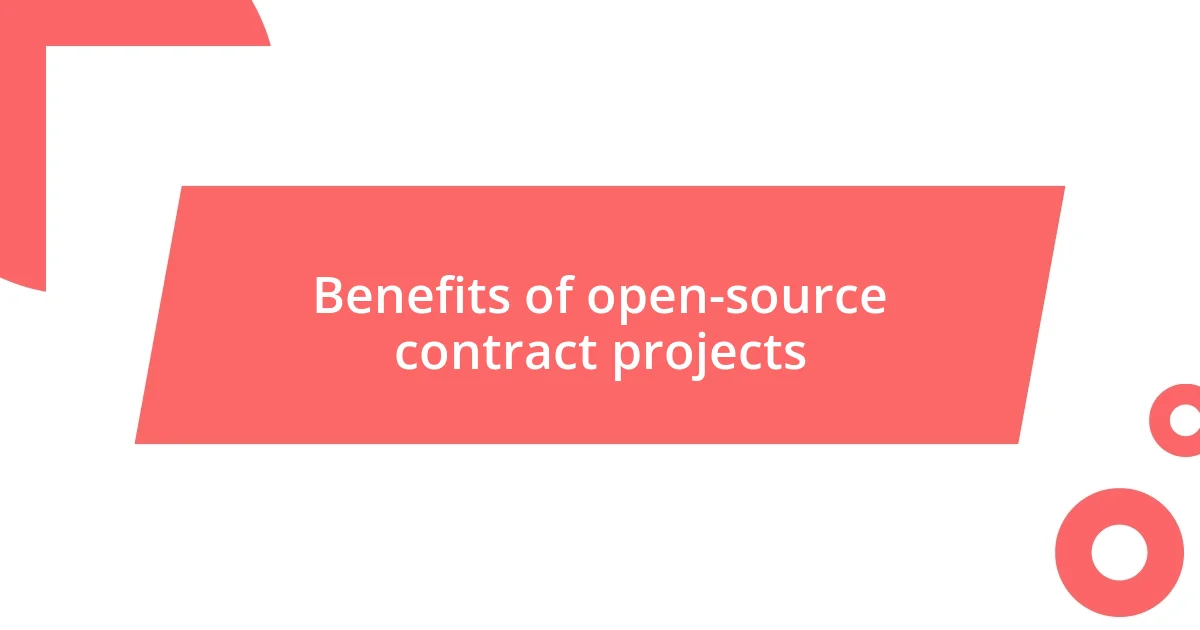
Benefits of open-source contract projects
One of the most striking benefits of open-source contract projects is the incredible level of collaboration they foster. I remember a particular project where a group of us from different continents came together, each bringing unique skills to the table. The synergy was palpable! Working alongside other passionate developers not only boosted my knowledge but also broadened my perspective on problem-solving. Engaging with such a diverse group truly highlighted the power of shared goals.
Here are some key benefits I’ve seen firsthand:
- Enhanced Innovation: Diverse minds collaborating can spark creativity and innovation in ways a single team might not achieve.
- Increased Transparency: Everyone can see and understand the project development, fostering trust among contributors.
- Skill Development: I found myself learning new programming languages and tools as I interacted with others, enhancing my own skill set.
- Global Reach: Having access to talent from all over the world can lead to more comprehensive solutions.
- Cost-Effectiveness: Open-source projects often require fewer resources compared to traditional development processes, which can result in significant savings.
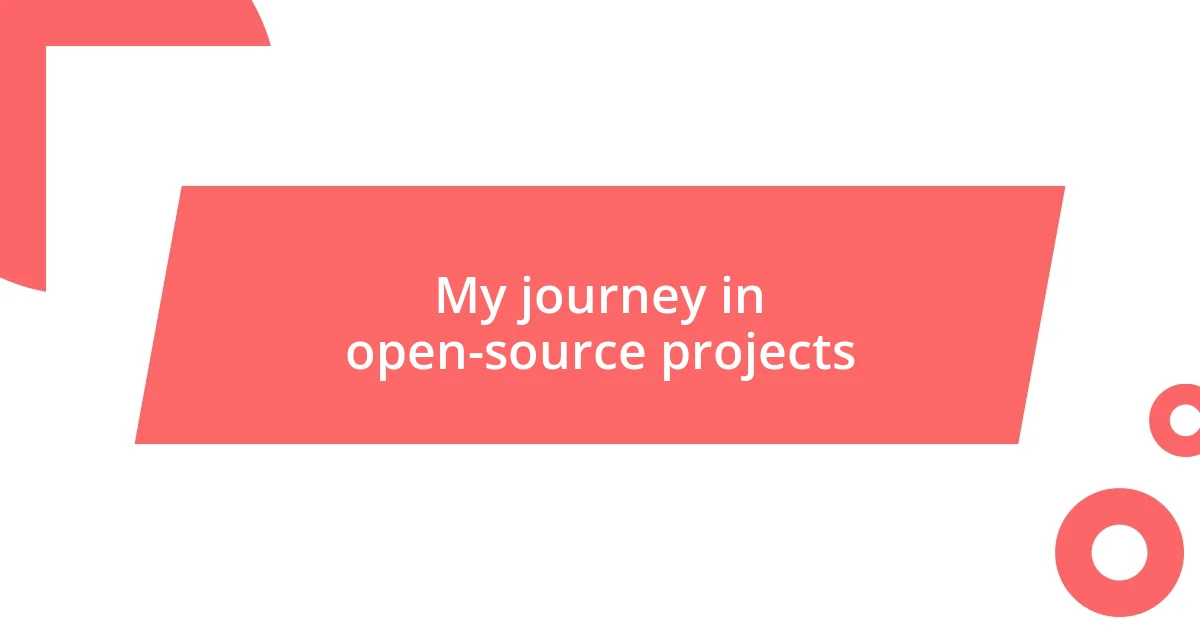
My journey in open-source projects
My journey in open-source projects has been nothing short of transformative. The first time I contributed to an open-source codebase, I felt that exhilarating mix of excitement and anxiety; my code was out there for the world to see! It was somewhat scary, but I quickly discovered that the feedback loop was incredibly beneficial. The constructive criticism I received helped me grow as a developer, revealing just how supportive the open-source community can be.
Over time, I became not just a contributor, but also a mentor for newcomers. I vividly recall guiding a young developer who was tackling their first pull request. Their passion reminded me of my earlier days, and it rekindled my own enthusiasm for collaboration. There’s something uniquely rewarding about helping others navigate the same path I once walked, turning my personal journey into a shared experience that benefits us all.
Reflecting on my experiences, I appreciate how open-source projects have not only enhanced my technical skills but have also taught me the importance of empathy in collaboration. Each project can feel like a small world of its own, where everyone has a role to play. I often think about how the connections I’ve made through these projects—often with people I’d never meet in person—make the global tech community feel a little smaller and more connected.
| Aspect | My Experience |
|---|---|
| First Contribution | Exciting yet intimidating |
| Mentorship | Rewarding to guide newcomers |
| Community | Fosters empathy and collaboration |
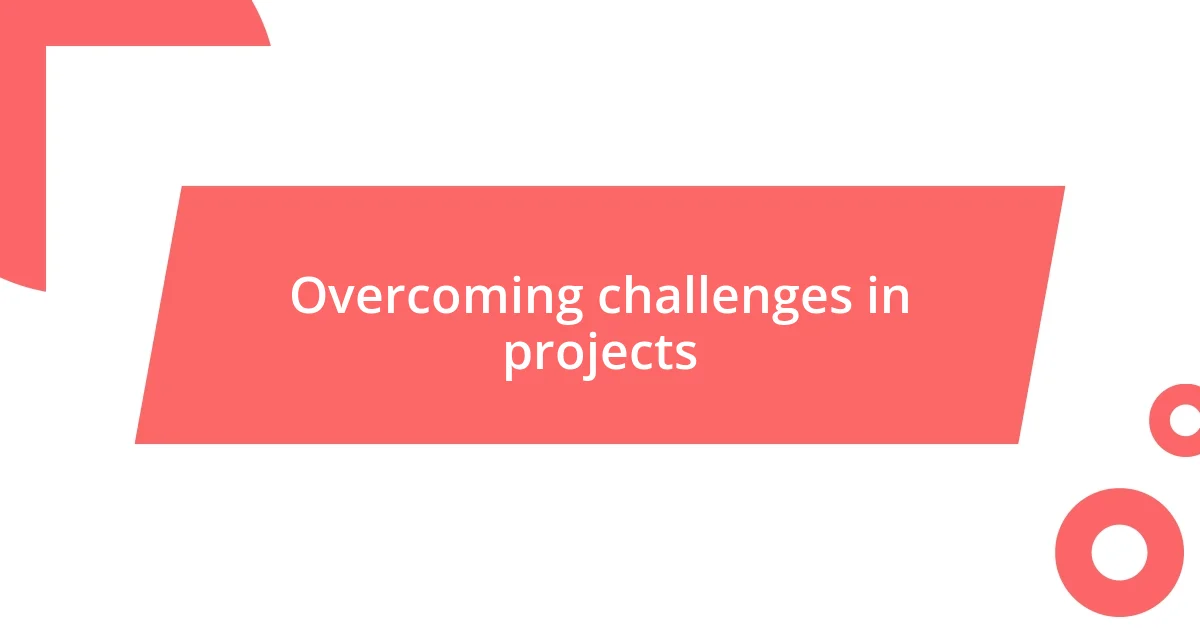
Overcoming challenges in projects
Overcoming challenges in projects often feels like an odyssey of growth. I remember one instance when a critical deadline loomed, and a critical bug reared its ugly head just two days before launch. I gathered the team for an impromptu code party; we put on our favorite playlists, fueled up on caffeine, and collectively debugged. The energy was electric! In those high-pressure moments, the camaraderie and shared passion turned a daunting task into a fulfilling experience.
There was another time when communication barriers became a challenge. Our team included developers from multiple time zones, which led to awkward collaboration hours. I took it upon myself to create a shared document detailing our workflows and expectations. This little initiative transformed the way we operated, streamlining our efforts and fostering a deeper understanding between team members. Isn’t it fascinating how sometimes all it takes is a simple structure to enhance collaboration?
Reflecting on these experiences, I realize that every challenge can unveil hidden strengths. We often think of setbacks as negative, but they can be catalysts for innovation. The thrill of overcoming obstacles together not only strengthens our skills but also bonds us as a community. I still cherish those moments; they remind me of the resilience and creativity that thrive when we tackle challenges as a united front.
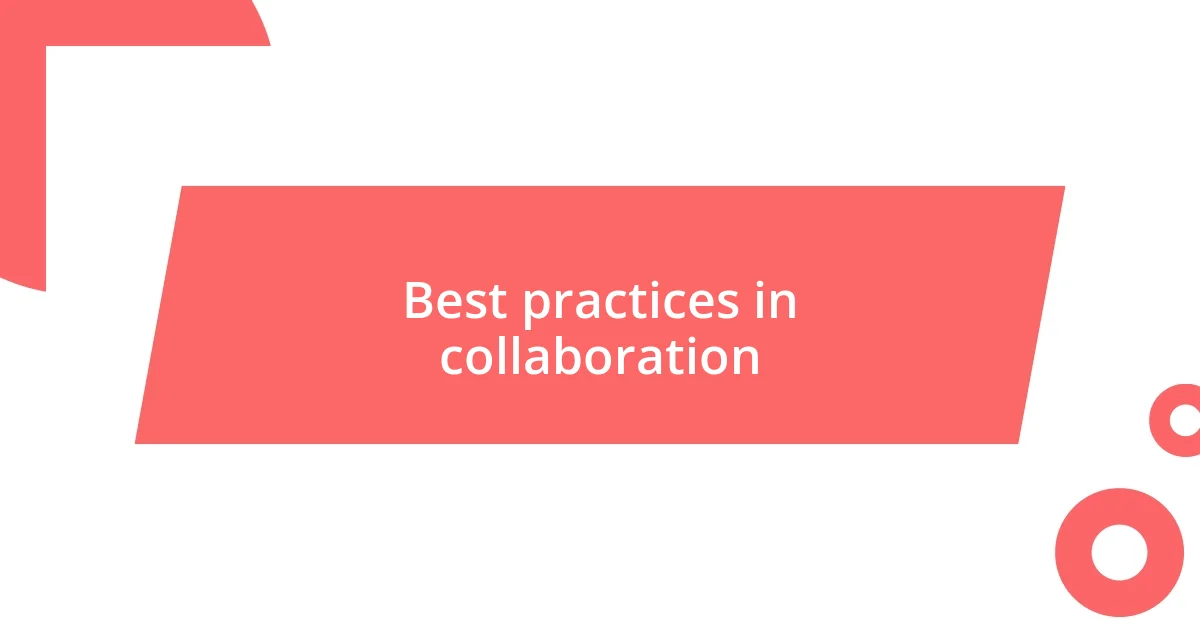
Best practices in collaboration
Collaboration in open-source projects thrives on effective communication. I remember joining a new project where daily stand-up meetings became our lifeblood. Those short, focused check-ins changed everything; they not only kept us aligned on our tasks, but also fostered a sense of accountability. It was amazing how, by sharing our challenges and wins daily, we created an environment where everyone felt heard and valued. Have you ever noticed how regular updates can transform a team dynamic?
Trust is another pillar of successful collaboration. In one of my earlier projects, I encountered a developer whose style was completely different from mine. Instead of butting heads, we decided to pair program regularly. This experience not only improved our code quality but also built mutual respect. I often ask myself, how many opportunities for growth we might miss if we don’t take the time to understand each other’s perspectives?
Lastly, celebrating small victories can boost team morale and strengthen bonds. I’ve seen the tremendous impact of simply acknowledging a fellow contributor’s effort, whether it’s a well-executed feature or a thoughtful code review. After one particularly challenging sprint, we organized a virtual pizza party to honor everyone’s hard work. It spun off genuine laughter and connection that went beyond just code. Isn’t it remarkable how a simple gesture can remind us that we’re all in this journey together?
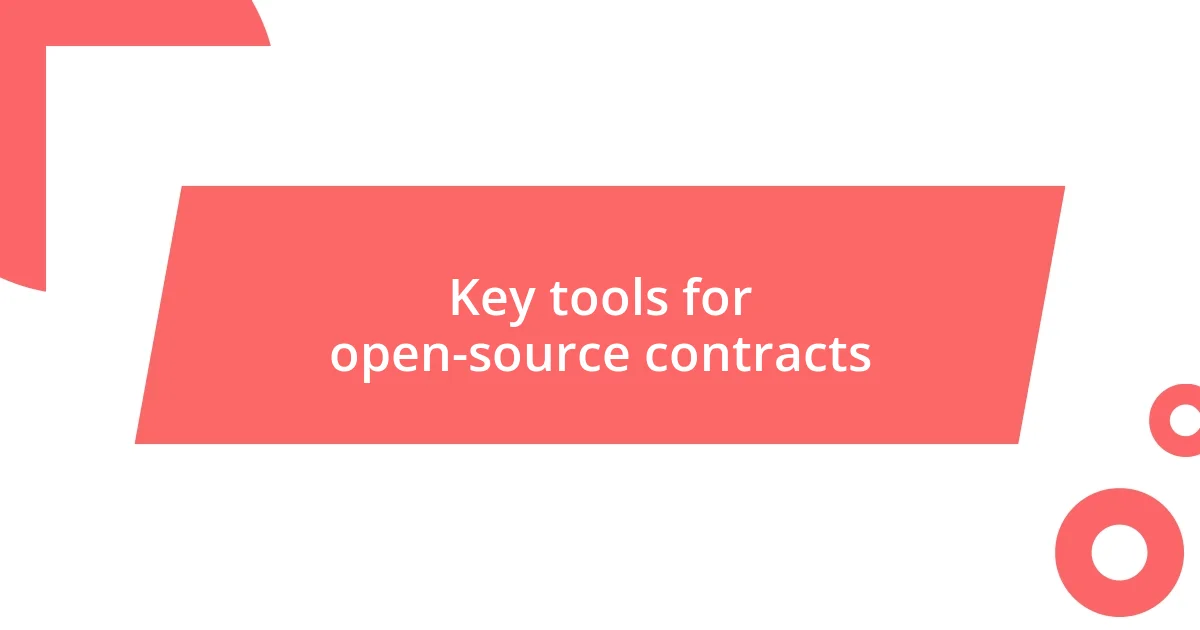
Key tools for open-source contracts
When diving into open-source contracts, having the right tools is crucial. I’ve found that platforms like GitHub and GitLab not only streamline code collaboration but also improve contract visibility. For example, during one project, I used GitHub’s issue tracking to manage tasks related to contract updates, and it made all the difference. Isn’t it fascinating how one tool can transform workflows and keep everyone on the same page?
Another invaluable tool I’ve encountered is DocuSign. In open-source contracts, it’s vital to have a clear, easy way to handle signatures. The first time I integrated DocuSign into our contracting process, I was amazed at how much time we saved. No more lengthy email exchanges; it was quick and seamless! Have you ever experienced the relief of cutting down bureaucratic hurdles in collaboration?
Lastly, I can’t stress enough the importance of documentation tools like Confluence. Building a solid knowledge base for contracts can serve as a great reference point for everyone involved. I remember organizing a workshop to study our contractual obligations, which ended up sparking lively discussions that deepened our understanding. It’s incredible how sharing knowledge can catalyze innovation within an open-source community, isn’t it?
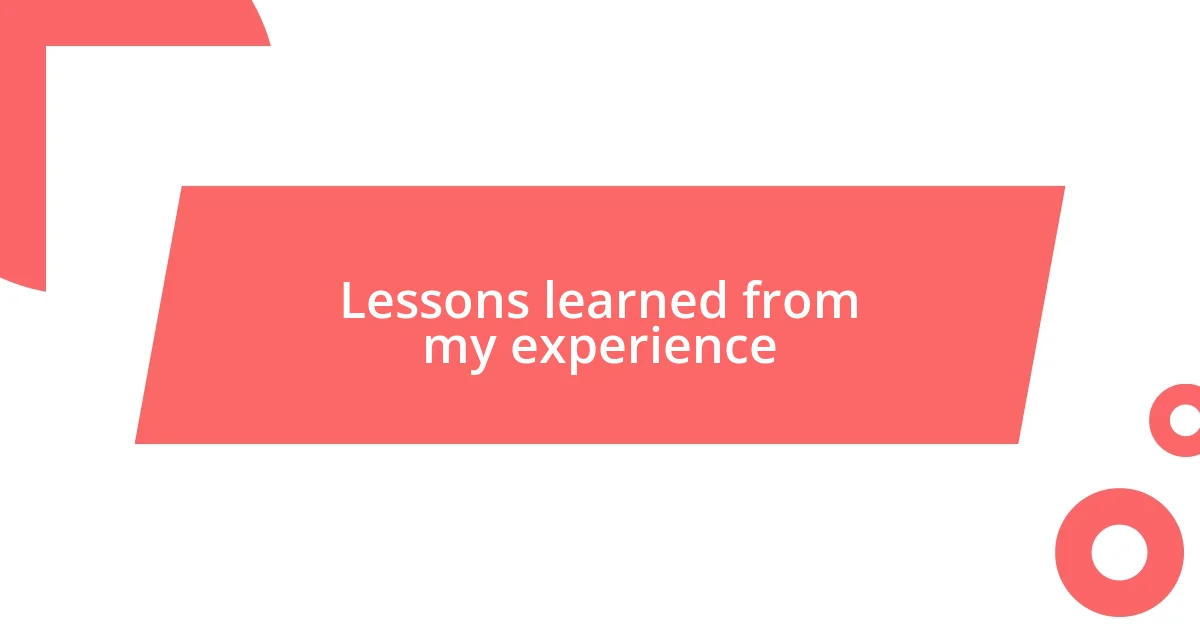
Lessons learned from my experience
I learned early on that flexibility is key in open-source contract projects. There was a moment when our initial scope shifted dramatically due to user feedback. I was initially frustrated, but I realized adaptability allowed us to better meet the community’s needs. Can you imagine how staying too rigid could have stifled our project’s success?
One critical lesson was the importance of inclusive decision-making. In one project, we had a passionate discussion that included voices from regularly overlooked contributors. It was eye-opening; ideas we hadn’t considered before breathed new life into our contracts. Isn’t it invigorating to witness how diverse perspectives can lead to richer outcomes?
Finally, I discovered that reflection is just as vital as action. After completing a project, I initiated a retrospective to discuss what went well and what could improve. This honest conversation fostered vulnerability and trust among team members. Have you ever taken the time to reflect on your processes—what did it reveal about your collaboration style?





